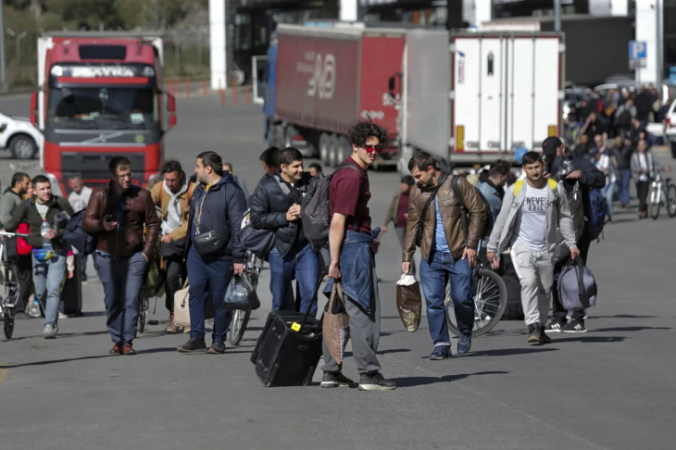
USA: Vsevolod travelled four days by car from Moscow to Georgia's southern border. At one point, he had to leave his car and continue on foot.
He finally crossed the border on Tuesday after travelling 1,800 kilometres (1,100 miles) to avoid being drafted into Russia's war in Ukraine.
He told the Associated Press, requesting anonymity out of concern for retaliation from Russia, "At 26 I do not want to be carried home in a zinc-lined (coffin) or stain (my) hands with someone's blood because of the war of one person that wants to build an empire."
Also Read: Russia's border crossings with Finland are at record highs
He was one of more than 194,000 Russian citizens who have fled to neighbouring Georgia, Kazakhstan, and Finland over the past week since President Vladimir Putin announced a partial mobilisation of reservists. Most of them travelled by car, bicycle, or foot.
After Putin's address to the nation on September 21, a large exodus of men—alone or with their families or friends—began and has continued throughout this week.
Airline tickets, which were in high demand on the few airlines still operating out of Russia, were quickly purchased by them. The others, however, had to refuel their vehicles and join the lengthy queues that snaked along the highways leading to the borders.
The traffic jam leading to Verkhny Lars, a border crossing into Georgia from Russia's North Ossetia region, reportedly stretched for about 15km (over 9 miles) on Tuesday, according to the online service Yandex Maps.
After Russian border guards relaxed rules and permitted foot traffic, social media showed hundreds of pedestrians lining up at the checkpoint.
At some crossings into Kazakhstan, there were reportedly similarly long lines.
Since last week, more than 53,000 Russians, according to the interior ministry of Georgia, while 98,000, according to the interior ministry of Kazakhstan. Over 43,000 people arrived in the same period, according to the Finnish Border Guard agency. Additional 3,000 Russians reportedly entered Mongolia, which also borders Russia, according to media reports.
In an effort to stop the flow, Russian authorities forbade some men from leaving and cited mobilisation laws. Although it didn't appear to be a common practise, there were persistent rumours that Moscow might soon close its borders to all men of fighting age.
Authorities in North Ossetia confirmed to the state news agency Tass that Russian men are receiving call-up summonses at border crossings into Georgia and that a temporary enlistment office will be set up at the Verkhny Lars crossing.
Also Read: People are detained in Dagestan after a police confrontation with anti-mobilization protesters
Only about 300,000 men with prior military service or combat experience would be mustered, according to Sergei Shoigu, Russia's minister of defence, but there have been reports from several Russian regions that recruiters were rounding up men who did not fit that description.
Fears of a much wider call-up were stoked by this, causing men of all ages and backgrounds to swarm airports and borders in large numbers.
A St. Petersburg resident who travelled to Kazakhstan on Tuesday said, "There's a risk that they will announce a full mobilisation." The man, who asked to remain anonymous out of concern for his safety, claimed that it took him three days to travel from his home to Uralsk in northwest Kazakhstan close to the border.
He added: "People worry that sooner or later, a full mobilisation will be announced, and no one will be able to cross the borders." He claimed that Putin's remarks on the mobilisation were different from what his decree stated, leaving room for a more expansive interpretation.
The two former Soviet Union nations of Kazakhstan and Georgia, which both allow Russian citizens entry without a visa, appeared to be the most well-liked escape routes for those travelling by land after being called up. Norway and Finland demand visas.
Georgia, which supports Ukraine as evidenced by the yellow and blue flags flying from buildings and the anti-Putin and anti-Russian graffiti, has some reservations about the influx of Russians, particularly after the nation engaged in a brief war with Moscow in 2008.
Politicians in the opposition have urged the government to take drastic measures against the arriving Russians, such as requiring visas or outright banning them. Such a step has not yet been taken.
Kazakhstan seems to be more hospitable. The 19 million-strong Central Asian country has become more independent from its ally, Moscow, since the start of the conflict, particularly in regards to the conflict in Ukraine.
Interior Minister of Kazakhstan Marat Akhmetzhanov said in announcing the number of Russians who had crossed the border that authorities wouldn't send those evading the call-up home unless they were listed on a global wanted list for criminal offences.
Because of the "current hopeless situation," President Kassym-Jomart Tokayev even instructed his government to assist Russians in entering his nation.
"We must look after them and make sure they are secure. Both politics and humanitarianism are involved. I gave the government the go-ahead to implement the necessary steps," he said, adding that Kazakhstan and Russia would discuss the situation.
Volunteers in Uralsk assisted people entering the 236,000-person city. Some of them told the AP that they were assisting the new arrivals in finding lodging, which was quickly filling up, while also providing free hot meals. One volunteer suggested that those who are unable to locate apartments or hotel rooms spend the night in gyms.
Also Read: Gunman killed 13 people including children in a Russian school
The Cinema Park theater's director, Dilara Mukhambetova, even offered her facility for sleeping to any arriving Russians after she drove around the city and noticed numerous individuals who appeared lost.
Local media cited Mukhambetova as saying, "We freed up one auditorium, organised tea, and volunteers brought hot meals." We filled four auditoriums, which could hold a total of about 200 people.